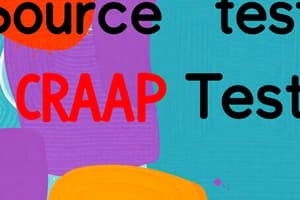Podcast
Questions and Answers
When evaluating a source, what should one consider regarding the author's stance?
When evaluating a source, what should one consider regarding the author's stance?
- Whether the author is a New York Times best-selling author.
- Whether the author has a large social media following.
- Whether the author strives for objectivity or reveals a particular bias. (correct)
- Whether the author is a member of a politically affiliated organization.
To ensure a comprehensive understanding of a topic during research, what approach should be taken regarding sources that challenge one's own views?
To ensure a comprehensive understanding of a topic during research, what approach should be taken regarding sources that challenge one's own views?
- Reflect a variety of views on your topic, showing that you've considered the subject thoroughly. (correct)
- Reject sources that challenge your views to maintain consistency.
- Only use sources from authors with established expertise.
- Focus solely on sources that support your initial thesis.
What is the significance of determining the intended audience and purpose of a source during research?
What is the significance of determining the intended audience and purpose of a source during research?
- It is crucial for verifying the author's credentials and expertise.
- It only matters if you are part of the intended audience.
- It helps in understanding the context and potential biases influencing the information. (correct)
- It is important for determining the font size and layout of the text.
What primary action should be taken if a source presents a position that differs from your own during research?
What primary action should be taken if a source presents a position that differs from your own during research?
In the context of research, what is the key consideration when evaluating whether a source supports or challenges your thesis?
In the context of research, what is the key consideration when evaluating whether a source supports or challenges your thesis?
When evaluating potential sources for a research paper, why is it important to consider the author's credentials?
When evaluating potential sources for a research paper, why is it important to consider the author's credentials?
How does understanding your audience influence your choice of sources when conducting research?
How does understanding your audience influence your choice of sources when conducting research?
Why is it important to evaluate the stance of a source when conducting research?
Why is it important to evaluate the stance of a source when conducting research?
Which question is LEAST relevant when initially determining if a source is worth examining for a research project?
Which question is LEAST relevant when initially determining if a source is worth examining for a research project?
When conducting research, why is it important to consult sources with a variety of viewpoints?
When conducting research, why is it important to consult sources with a variety of viewpoints?
What is the primary reason for checking the publisher or sponsor of a source during the evaluation process?
What is the primary reason for checking the publisher or sponsor of a source during the evaluation process?
How does the type of publication (e.g., scholarly journal vs. website) impact your evaluation of a source's reliability?
How does the type of publication (e.g., scholarly journal vs. website) impact your evaluation of a source's reliability?
When evaluating sources, how should you approach web-based texts compared to those found in library databases?
When evaluating sources, how should you approach web-based texts compared to those found in library databases?
When evaluating a source, which URL suffix most likely indicates the website is affiliated with the US Department of Defense?
When evaluating a source, which URL suffix most likely indicates the website is affiliated with the US Department of Defense?
Why is it important to consider the publication date when evaluating a source, and what is a practical first step when dealing with an undated online source?
Why is it important to consider the publication date when evaluating a source, and what is a practical first step when dealing with an undated online source?
Which factor most strongly suggests that a book or article will contain rigorously reviewed, in-depth discussion suitable for research?
Which factor most strongly suggests that a book or article will contain rigorously reviewed, in-depth discussion suitable for research?
When evaluating a source, what should you consider about the publisher's or sponsor's motives?
When evaluating a source, what should you consider about the publisher's or sponsor's motives?
How does assessing the level of a text contribute to evaluating its suitability for academic work?
How does assessing the level of a text contribute to evaluating its suitability for academic work?
When evaluating an author's argument, what indicates credible support for their positions?
When evaluating an author's argument, what indicates credible support for their positions?
In critically reading sources, how should an author's stance influence your evaluation of their argument?
In critically reading sources, how should an author's stance influence your evaluation of their argument?
Apart from assessing the arguments presented, why is it important to examine the bibliography of a source more closely?
Apart from assessing the arguments presented, why is it important to examine the bibliography of a source more closely?
Flashcards
Research Purpose
Research Purpose
The main objective or aim of your research or writing.
Target Audience
Target Audience
The intended readers or audience for your work.
Reliable Source
Reliable Source
A source that is trustworthy and credible.
Scholarly Source
Scholarly Source
Signup and view all the flashcards
Source Relevance
Source Relevance
Signup and view all the flashcards
Author Credentials
Author Credentials
Signup and view all the flashcards
Author Stance
Author Stance
Signup and view all the flashcards
Publisher/Sponsor
Publisher/Sponsor
Signup and view all the flashcards
Author's Objectivity
Author's Objectivity
Signup and view all the flashcards
Intended Audience
Intended Audience
Signup and view all the flashcards
Author's Purpose
Author's Purpose
Signup and view all the flashcards
Acknowledge a Source
Acknowledge a Source
Signup and view all the flashcards
Refute
Refute
Signup and view all the flashcards
Scholarly Source Review
Scholarly Source Review
Signup and view all the flashcards
URL Suffix Clues
URL Suffix Clues
Signup and view all the flashcards
Author's Motives
Author's Motives
Signup and view all the flashcards
Source Level
Source Level
Signup and view all the flashcards
Publication Date
Publication Date
Signup and view all the flashcards
Bibliography Usefulness
Bibliography Usefulness
Signup and view all the flashcards
Author's Arguments
Author's Arguments
Signup and view all the flashcards
Study Notes
- This chapter advises on evaluating sources to determine if a source is useful for your purposes.
- Then, you will read the sources with a critical eye.
Considering Source Usefulness
- Think about your purpose: Are you trying to persuade or to inform? If the former, it will be especially important to find sources representing various positions; if the latter, you may need sources that are more factual or informative.
- Reconsider your audience and what sources will be persuasive to them.
- Questions to judge if a source deserves your time and attention:
- Is it reliable and scholarly?
- Is it peer-reviewed?
- Is it published in a reputable journal, magazine, or by a reputable publisher?
- Was it found in a library database or on the web?
- Evaluating web-based texts may require more work and scrutiny than results from library databases.
- Results need to be scanned to quickly evaluate their reliability.
- Is it relevant? How does the source relate to your purpose and what will it add to your work?
- Look at the title and at introductory material to see what the text covers.
- What are the author's credentials and qualifications to write on the subject?
- Is the author associated with a particular position on the issue?
- See whether the source mentions other works this author has written, or search the web to learn more about them.
- What is the stance?
- Does a source cover various points of view or only advocate one?
- Does the title suggest a certain slant?
- If online, does it include links to other sites, and if so, what are their perspectives?
- Consult sources with a variety of viewpoints.
- Who is the publisher or sponsor?
- Books published by university presses and articles in scholarly journals are reviewed by experts before publication.
- For online sources, evaluate the publisher's or sponsor's motives:
- Is it to present information evenly, to promote a belief, or to sell something?
- What is the source's level? -Is it easy to understand but not authoritative, or authoritative but hard to comprehend?
- When was it published and last updated?
- Recent does not necessarily mean better.
- Some topics may require very current information, while others use older sources.
- Is it available?
- If your school's library doesn't have a book, can you get it through interlibrary loan?
- Does it include other useful information?
- Is there a bibliography that might lead you to other sources and how current are the sources it cites?
Reading Sources with a Critical Eye
- After deciding to examine a source more closely, use the following questions:
- What arguments does the author make?
- Present a number of different positions, or argue for a particular position?
- You may need to analyze the argument.
- How persuasive do you find the argument?
- What reasons and evidence does the author provide in support of any position(s)?
- Are there citations or links, and if so, are they credible?
- Is any evidence presented without citations?
- Do you find any of the author's assumptions questionable?
- How thoroughly does he or she consider opposing arguments?
- What is the author's stance?
- Strive for objectivity, or does the content or language reveal a particular bias?
- Consider opposing views and treat them fairly?
- Do you recognize ideas you've run across in other sources?
- Does the source leave out any information or perspective that other sources include?
- Does this source support or challenge your own position--or does it do both?
- Support your thesis, offer a different argument altogether, or represent a position you need to acknowledge or refute?
- Don't reject a source just because it challenges your views
- What can you tell about the intended audience and purpose?
- Are you a member of the audience addressed, and if not, does that affect the way you interpret what you read?
- Is the main purpose to inform readers about a topic or to argue a point?
Studying That Suits You
Use AI to generate personalized quizzes and flashcards to suit your learning preferences.




